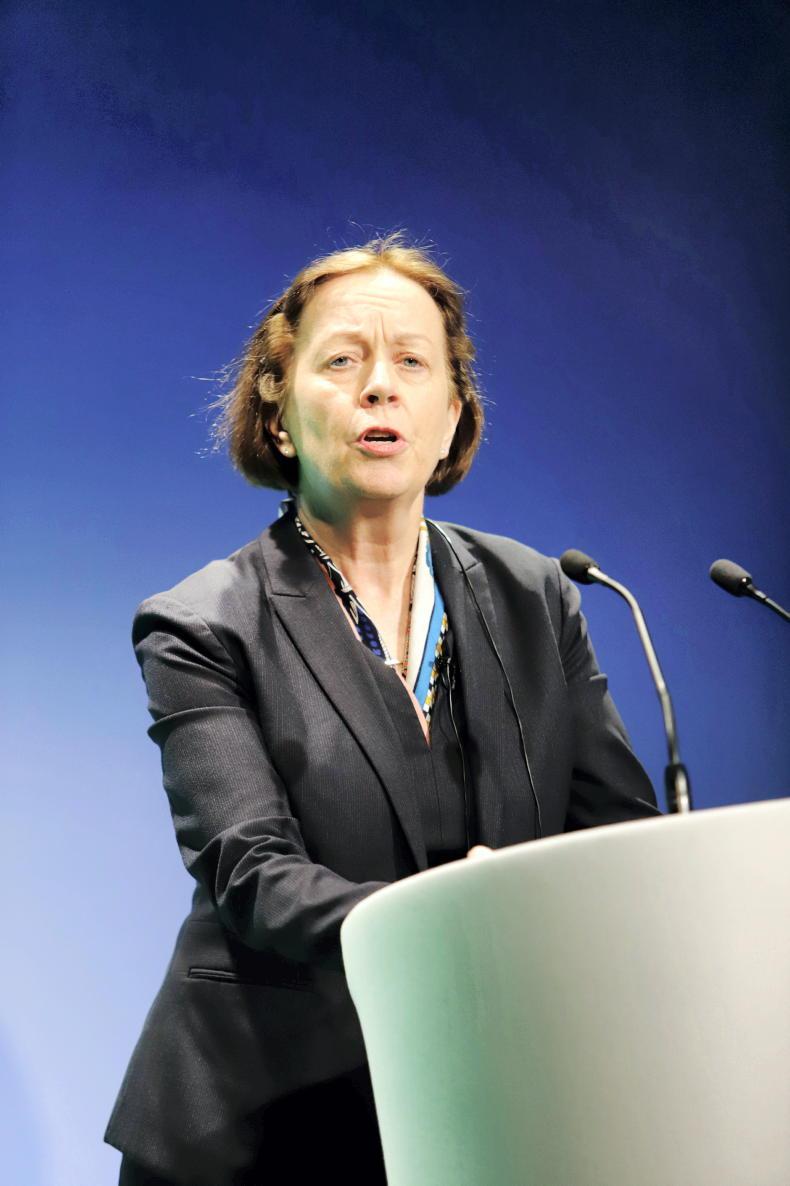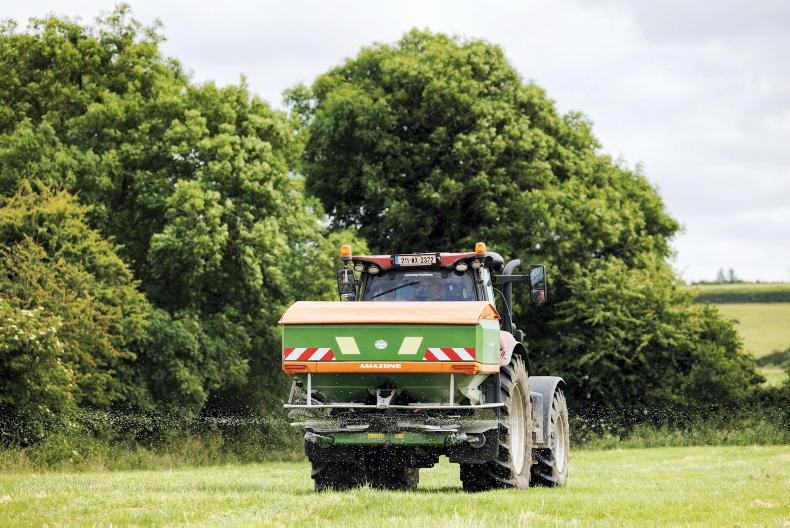Reduced meat and dairy consumption of up to 35% by 2050 is necessary if the UK is to reach net zero by that date, Climate Change Committee (CCC) chair Lord Deben has said.
Addressing a climate change event organised by DAERA and the Ulster Farmers’ Union (UFU) at Greenmount last Wednesday, he urged local farmers to face facts, which ultimately will mean up to 46% of land is taken out of production to grow trees, sequester carbon, etc.
“Yes, we are suggesting that we have fewer animals,” he said, adding that current health advice is also that we eat too much food, and too much beef in particular.
“If people eat less beef, they can use the money they save by eating better – that is the line we should go for,” he suggested.
While the CCC chair did not explicitly define what he meant by “better”, he did point to pasture-fed livestock, typical of production systems in NI, and which already has a much lower carbon footprint than global competitors.

Lord Deben, the chair of the UK climate change committee, with UFU president, Victor Chestnutt (left) and DAERA Minister Edwin Poots.
He maintained that with the focus on climate change, there is now a real opportunity to drive home the message to consumers to “eat less, better and local”, which ultimately would mean buying meat from NI.
“You ought to be cheering me on,” Lord Deben suggested.
If the farming industry fails to take the opportunity, he warned it faces significant competition from plant-based foods and lab-produced meat as they take control of the narrative around cutting greenhouse gas emissions.
However, he also acknowledged that it is an unpalatable message to be telling farmers to produce less at the same time as the UK government has opened its doors to beef, lamb and dairy products from Australia and New Zealand.
NI MPs should be pressing the government very strongly and heavily on this front
Having previously labelled these trade deals as “unacceptable” and “a disgrace”, he said that the same standards expected of UK farmers around animal welfare, food safety and climate change should be applied to imports.
“If you do have trade deals which enable people to sell goods in our country without the same standards, what you then do is to export your carbon footprint, and that is a fat lot of use. NI MPs should be pressing the government very strongly and heavily on this front,” he said.
Ultimately, however, whether these countries gain a foothold in the British market will depend on retailers and food service companies, many of whom have made commitments around greenhouse gas (GHG) emissions. If they use only local produce in future, the trade deals become meaningless, accepted Lord Deben.
Target
Before he concluded, he again reminded his audience that the CCC advice is that NI can achieve a reduction in carbon emissions of at least 82% by 2050 as its fair contribution to an overall target for the UK to be net zero by that date.
You frankly can’t reach net zero by 2050, but you can do about 84% of it
However, the net zero target as included in the private member’s bill being considered by MLAs at Stormont is not realistic.
“You frankly can’t reach net zero by 2050, but you can do about 84% of it. Unless you are saying that the world shall farm without any animals, you know that farming cannot get down to net zero,” he said.
Prof Stanton questions global dietary advice
Some of the facts being quoted by various committees and policymakers around human diet and health are not always backed up by evidence, Professor Alice Stanton from the Royal College of Surgeons in Ireland told attendees at last Wednesday’s climate event.

Professor Alice Stanton from the Royal College of Surgeons in Ireland.
In particular, she cited the Global Burden of Diseases (GBD) report published in the leading scientific journal, The Lancet.
When compared to the 2017 GBD study, in the 2019 version it estimated that red meat consumption causes 896,000 deaths globally each year, which was a 36-fold increase from the 2017 analysis. According to the 2019 study, eating any red meat at all will increase the risk of heart attacks, strokes, etc.
They need to report all of the evidence, so that everyone can look at it
However, while the report authors had previously used evidence from medical literature which anyone can interrogate, how they arrived at their 2019 conclusions is not clear.
“They need to report all of the evidence, so that everyone can look at it. This non-transparent, non-evidence-based global health estimate is already influencing the national food strategy [in England], and may well influence the CCC and other UN COP26 committees,” said Stanton.
I’m not the only doctor who says that we should continue to eat meat and dairy in appropriate proportions
She said that there was some “low certainty evidence” to suggest that excessive red meat consumption (in excess of 75g/day) may be associated with an increased risk of colon cancer and cardiovascular events. However, she pointed out that red meat provides essential amino acids, minerals and vitamins, and that too often, policymakers focus on those who eat food in excess, and not the estimated 2bn people globally who don’t have a sufficiently high quality diet.
“I’m not the only doctor who says that we should continue to eat meat and dairy in appropriate proportions. The scientists, the medical societies, the farming groups, everyone involved in farming should write to The Lancet and ask for the underlying evidence,” she said.
Ultra-processed
Stanton also warned about the dangers of ultra-processed foods, including in that bracket meat and dairy alternatives.
“They are really high in added sugars, salt, colorants, flavours, etc.
“The beyond meat burger has the same protein content as steak, but has x5 the salt – not a good idea,” she said, adding that “no child should be fed almond milk” given the lack of protein and zinc.
“If we replace fresh meat and dairy with additive rich, calorie rich ultra-processed foods, so as to solve GHG emissions, there will be deleterious impacts on human health,” she concluded.
Read more
NZ scores big win in UK trade deal
Net zero target is morally wrong, MLAs told
Reduced meat and dairy consumption of up to 35% by 2050 is necessary if the UK is to reach net zero by that date, Climate Change Committee (CCC) chair Lord Deben has said.
Addressing a climate change event organised by DAERA and the Ulster Farmers’ Union (UFU) at Greenmount last Wednesday, he urged local farmers to face facts, which ultimately will mean up to 46% of land is taken out of production to grow trees, sequester carbon, etc.
“Yes, we are suggesting that we have fewer animals,” he said, adding that current health advice is also that we eat too much food, and too much beef in particular.
“If people eat less beef, they can use the money they save by eating better – that is the line we should go for,” he suggested.
While the CCC chair did not explicitly define what he meant by “better”, he did point to pasture-fed livestock, typical of production systems in NI, and which already has a much lower carbon footprint than global competitors.

Lord Deben, the chair of the UK climate change committee, with UFU president, Victor Chestnutt (left) and DAERA Minister Edwin Poots.
He maintained that with the focus on climate change, there is now a real opportunity to drive home the message to consumers to “eat less, better and local”, which ultimately would mean buying meat from NI.
“You ought to be cheering me on,” Lord Deben suggested.
If the farming industry fails to take the opportunity, he warned it faces significant competition from plant-based foods and lab-produced meat as they take control of the narrative around cutting greenhouse gas emissions.
However, he also acknowledged that it is an unpalatable message to be telling farmers to produce less at the same time as the UK government has opened its doors to beef, lamb and dairy products from Australia and New Zealand.
NI MPs should be pressing the government very strongly and heavily on this front
Having previously labelled these trade deals as “unacceptable” and “a disgrace”, he said that the same standards expected of UK farmers around animal welfare, food safety and climate change should be applied to imports.
“If you do have trade deals which enable people to sell goods in our country without the same standards, what you then do is to export your carbon footprint, and that is a fat lot of use. NI MPs should be pressing the government very strongly and heavily on this front,” he said.
Ultimately, however, whether these countries gain a foothold in the British market will depend on retailers and food service companies, many of whom have made commitments around greenhouse gas (GHG) emissions. If they use only local produce in future, the trade deals become meaningless, accepted Lord Deben.
Target
Before he concluded, he again reminded his audience that the CCC advice is that NI can achieve a reduction in carbon emissions of at least 82% by 2050 as its fair contribution to an overall target for the UK to be net zero by that date.
You frankly can’t reach net zero by 2050, but you can do about 84% of it
However, the net zero target as included in the private member’s bill being considered by MLAs at Stormont is not realistic.
“You frankly can’t reach net zero by 2050, but you can do about 84% of it. Unless you are saying that the world shall farm without any animals, you know that farming cannot get down to net zero,” he said.
Prof Stanton questions global dietary advice
Some of the facts being quoted by various committees and policymakers around human diet and health are not always backed up by evidence, Professor Alice Stanton from the Royal College of Surgeons in Ireland told attendees at last Wednesday’s climate event.

Professor Alice Stanton from the Royal College of Surgeons in Ireland.
In particular, she cited the Global Burden of Diseases (GBD) report published in the leading scientific journal, The Lancet.
When compared to the 2017 GBD study, in the 2019 version it estimated that red meat consumption causes 896,000 deaths globally each year, which was a 36-fold increase from the 2017 analysis. According to the 2019 study, eating any red meat at all will increase the risk of heart attacks, strokes, etc.
They need to report all of the evidence, so that everyone can look at it
However, while the report authors had previously used evidence from medical literature which anyone can interrogate, how they arrived at their 2019 conclusions is not clear.
“They need to report all of the evidence, so that everyone can look at it. This non-transparent, non-evidence-based global health estimate is already influencing the national food strategy [in England], and may well influence the CCC and other UN COP26 committees,” said Stanton.
I’m not the only doctor who says that we should continue to eat meat and dairy in appropriate proportions
She said that there was some “low certainty evidence” to suggest that excessive red meat consumption (in excess of 75g/day) may be associated with an increased risk of colon cancer and cardiovascular events. However, she pointed out that red meat provides essential amino acids, minerals and vitamins, and that too often, policymakers focus on those who eat food in excess, and not the estimated 2bn people globally who don’t have a sufficiently high quality diet.
“I’m not the only doctor who says that we should continue to eat meat and dairy in appropriate proportions. The scientists, the medical societies, the farming groups, everyone involved in farming should write to The Lancet and ask for the underlying evidence,” she said.
Ultra-processed
Stanton also warned about the dangers of ultra-processed foods, including in that bracket meat and dairy alternatives.
“They are really high in added sugars, salt, colorants, flavours, etc.
“The beyond meat burger has the same protein content as steak, but has x5 the salt – not a good idea,” she said, adding that “no child should be fed almond milk” given the lack of protein and zinc.
“If we replace fresh meat and dairy with additive rich, calorie rich ultra-processed foods, so as to solve GHG emissions, there will be deleterious impacts on human health,” she concluded.
Read more
NZ scores big win in UK trade deal
Net zero target is morally wrong, MLAs told










SHARING OPTIONS